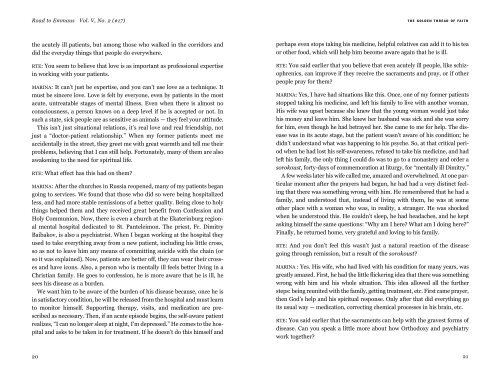the golden thread of faitha great success. The patients enjoyed themselves very much. However, I leftsoon after and the experience was not repeated.Although nowadays in Russia hospitalization is strictly voluntary and thepatient himself must be willing <strong>to</strong> be cured before he is admitted, a mentalhospital will always remain an institution, a closed place, even for patientswho come there of their own will. But, of course, the atmosphere greatlydepends on the doc<strong>to</strong>rs in charge.Another thing I tried <strong>to</strong> do was <strong>to</strong> participate in my patients’ lives in a realway. I also dealt with hypochondriacs, whose problem is that they are soconcentrated on their health that it becomes the meaning of life. The propertreatment is <strong>to</strong> make them come out of the borders in which the diseasehas confined them, <strong>to</strong> enlarge their world-view and <strong>to</strong> help them see thatthere are many different activities such as running, swimming, painting,writing, and so on. I wanted them <strong>to</strong> realize that good health cannot be anaim in itself, but that you need it in order <strong>to</strong> work, <strong>to</strong> love, <strong>to</strong> create. When Isuggested that one of my hypochondriac patients should do some jogging,he replied that he couldn’t do it without me, so I began <strong>to</strong> run with him everyday, <strong>to</strong> show him that life has many expressions. A person is master of hishealth and his illness; it is abnormal <strong>to</strong> let it master you. The disease belongs<strong>to</strong> you, you don’t belong <strong>to</strong> the disease.The hospital was also a great part of my own life. After my mother died, Ihad no one <strong>to</strong> leave my children with, and as our salaries were not highenough <strong>to</strong> allow me <strong>to</strong> pay for child-care, I had <strong>to</strong> take them with me <strong>to</strong> thehospital. My patients were always glad <strong>to</strong> see them. Children are spontaneous,lively, and pure, and they are a good contrast <strong>to</strong> the strict regime ofthe hospital. They were like a stream of fresh water, and they were grateful<strong>to</strong> the patients who played with them and amused them. The children’sminds were not poisoned with the awareness of who was sane and who wasill — they didn’t assess people by this criterion. Children only know “goodpeople” and “bad people.” They can tell the difference and this is what isreally important <strong>to</strong> them.<strong>RTE</strong>: You weren’t afraid for your children?MARINA: Never. I always loved my patients and they loved me, and I wasgrateful <strong>to</strong> them for looking after my children. My son, Vic<strong>to</strong>r, was eight atthe time and Masha, my daughter, was three. This lasted for about a year,and they were at the hospital almost every day. Of course, they were not withMarina Alexievna with co-worker.19
<strong>Road</strong> <strong>to</strong> <strong>Emmaus</strong> Vol. V, <strong>No</strong>. 2 (#17)the golden thread of faiththe acutely ill patients, but among those who walked in the corridors anddid the everyday things that people do everywhere.<strong>RTE</strong>: You seem <strong>to</strong> believe that love is as important as professional expertisein working with your patients.MARINA: It can’t just be expertise, and you can’t use love as a technique. Itmust be sincere love. Love is felt by everyone, even by patients in the mostacute, untreatable stages of mental illness. Even when there is almost noconsciousness, a person knows on a deep level if he is accepted or not. Insuch a state, sick people are as sensitive as animals — they feel your attitude.This isn’t just situational relations, it’s real love and real friendship, notjust a “doc<strong>to</strong>r-patient relationship.” When my former patients meet meaccidentally in the street, they greet me with great warmth and tell me theirproblems, believing that I can still help. Fortunately, many of them are alsoawakening <strong>to</strong> the need for spiritual life.<strong>RTE</strong>: What effect has this had on them?MARINA: After the churches in Russia reopened, many of my patients begangoing <strong>to</strong> services. We found that those who did so were being hospitalizedless, and had more stable remissions of a better quality. Being close <strong>to</strong> holythings helped them and they received great benefit from Confession andHoly Communion. <strong>No</strong>w, there is even a church at the Ekaterinburg regionalmental hospital dedicated <strong>to</strong> St. Panteleimon. The priest, Fr. DimitryBaibakov, is also a psychiatrist. When I began working at the hospital theyused <strong>to</strong> take everything away from a new patient, including his little cross,so as not <strong>to</strong> leave him any means of committing suicide with the chain (orso it was explained). <strong>No</strong>w, patients are better off, they can wear their crossesand have icons. Also, a person who is mentally ill feels better living in aChristian family. He goes <strong>to</strong> confession, he is more aware that he is ill, hesees his disease as a burden.We want him <strong>to</strong> be aware of the burden of his disease because, once he isin satisfac<strong>to</strong>ry condition, he will be released from the hospital and must learn<strong>to</strong> moni<strong>to</strong>r himself. Supporting therapy, visits, and medication are prescribedas necessary. Then, if an acute episode begins, the self-aware patientrealizes, “I can no longer sleep at night, I’m depressed.” He comes <strong>to</strong> the hospitaland asks <strong>to</strong> be taken in for treatment. If he doesn’t do this himself andperhaps even s<strong>to</strong>ps taking his medicine, helpful relatives can add it <strong>to</strong> his teaor other food, which will help him become aware again that he is ill.<strong>RTE</strong>: You said earlier that you believe that even acutely ill people, like schizophrenics,can improve if they receive the sacraments and pray, or if otherpeople pray for them?MARINA: Yes, I have had situations like this. Once, one of my former patientss<strong>to</strong>pped taking his medicine, and left his family <strong>to</strong> live with another woman.His wife was upset because she knew that the young woman would just takehis money and leave him. She knew her husband was sick and she was sorryfor him, even though he had betrayed her. She came <strong>to</strong> me for help. The diseasewas in its acute stage, but the patient wasn’t aware of his condition; hedidn’t understand what was happening <strong>to</strong> his psyche. So, at that critical periodwhen he had lost his self-awareness, refused <strong>to</strong> take his medicine, and hadleft his family, the only thing I could do was <strong>to</strong> go <strong>to</strong> a monastery and order asorokoust, forty-days of commemoration at liturgy, for “mentally ill Dimitry.”A few weeks later his wife called me, amazed and overwhelmed. At one particularmoment after the prayers had begun, he had had a very distinct feelingthat there was something wrong with him. He remembered that he had afamily, and unders<strong>to</strong>od that, instead of living with them, he was at someother place with a woman who was, in reality, a stranger. He was shockedwhen he unders<strong>to</strong>od this. He couldn’t sleep, he had headaches, and he keptasking himself the same questions: “Why am I here? What am I doing here?”Finally, he returned home, very grateful and loving <strong>to</strong> his family.<strong>RTE</strong>: And you don’t feel this wasn’t just a natural reaction of the diseasegoing through remission, but a result of the sorokoust?MARINA : Yes. His wife, who had lived with his condition for many years, wasgreatly amazed. First, he had the little flickering idea that there was somethingwrong with him and his whole situation. This idea allowed all the furthersteps: being reunited with the family, getting treatment, etc. First came prayer,then God’s help and his spiritual response. Only after that did everything goits usual way — medication, correcting chemical processes in his brain, etc.<strong>RTE</strong>: You said earlier that the sacraments can help with the gravest forms ofdisease. Can you speak a little more about how Orthodoxy and psychiatrywork <strong>to</strong>gether?<strong>20</strong>21
- Page 1 and 2:
A JOURNAL OF ORTHODOX FAITH AND CUL
- Page 3 and 4:
CHRIST,THE MEDICINEOF LIFE:The Syri
- Page 5 and 6:
Road to Emmaus Vol. VI, No. 1 (#20)
- Page 7 and 8:
Road to Emmaus Vol. VI, No. 1 (#20)
- Page 9 and 10:
CHRIST, THE MEDICINE OF LIFEterrors
- Page 11 and 12:
Road to Emmaus Vol. VI, No. 1 (#20)
- Page 13 and 14:
Road to Emmaus Vol. VI, No. 1 (#20)
- Page 15 and 16:
CHRIST, THE MEDICINE OF LIFEfallen
- Page 17 and 18:
Road to Emmaus Vol. VI, No. 1 (#20)
- Page 20 and 21:
Road to Emmaus Vol. VI, No. 1 (#20)
- Page 22 and 23:
Road to Emmaus Vol. VI, No. 1 (#20)
- Page 24 and 25:
CroaghPatrick:The GloriousClimb ofI
- Page 26 and 27:
Road to Emmaus Vol. XII, No. 2 (#45
- Page 28 and 29:
Road to Emmaus Vol. XII, No. 2 (#45
- Page 30 and 31:
Road to Emmaus Vol. XII, No. 2 (#45
- Page 32 and 33:
Road to Emmaus Vol. XII, No. 2 (#45
- Page 34 and 35:
Road to Emmaus Vol. XII, No. 2 (#45
- Page 36 and 37:
Road to Emmaus Vol. XII, No. 2 (#45
- Page 38 and 39:
Road to Emmaus Vol. XII, No. 2 (#45
- Page 40 and 41:
Road to Emmaus Vol. XII, No. 2 (#45
- Page 42 and 43:
Road to Emmaus Vol. XII, No. 2 (#45
- Page 44 and 45:
THEASTONISHINGMISSIONARYJOURNEYS OF
- Page 46 and 47:
the astonishing missionary journeys
- Page 48 and 49:
Road to Emmaus Vol. V, No. 4 (#19)a
- Page 51:
Road to Emmaus Vol. V, No. 4 (#19)t
- Page 55 and 56:
Road to Emmaus Vol. V, No. 4 (#19)t
- Page 57 and 58:
the astonishing missionary journeys
- Page 59 and 60:
the astonishing missionary journeys
- Page 61 and 62:
the astonishing missionary journeys
- Page 64 and 65:
Road to Emmaus Vol. V, No. 4 (#19)t
- Page 66 and 67:
Road to Emmaus Vol. V, No. 4 (#19)t
- Page 68 and 69:
Road to Emmaus Vol. V, No. 4 (#19)t
- Page 70 and 71:
Road to Emmaus Vol. V, No. 4 (#19)t
- Page 72 and 73:
Road to Emmaus Vol. XI, No. 4 (#43)
- Page 74 and 75:
Road to Emmaus Vol. XI, No. 4 (#43)
- Page 76 and 77:
Road to Emmaus Vol. XI, No. 4 (#43)
- Page 78 and 79:
Road to Emmaus Vol. XI, No. 4 (#43)
- Page 80 and 81:
Road to Emmaus Vol. XI, No. 4 (#43)
- Page 82 and 83:
Road to Emmaus Vol. XI, No. 4 (#43)
- Page 84 and 85:
Road to Emmaus Vol. XI, No. 4 (#43)
- Page 86 and 87:
Road to Emmaus Vol. XI, No. 4 (#43)
- Page 88 and 89:
Road to Emmaus Vol. XI, No. 4 (#43)
- Page 90 and 91:
Road to Emmaus Vol. XI, No. 4 (#43)
- Page 92 and 93:
NaturalConception,Natural Birth:The
- Page 94 and 95:
Road to Emmaus Vol. XIII, No. 2 (#4
- Page 96 and 97:
Road to Emmaus Vol. XIII, No. 2 (#4
- Page 98 and 99:
Road to Emmaus Vol. XIII, No. 2 (#4
- Page 100 and 101:
Road to Emmaus Vol. XIII, No. 2 (#4
- Page 102 and 103:
Road to Emmaus Vol. XIII, No. 2 (#4
- Page 104 and 105:
Road to Emmaus Vol. XIII, No. 2 (#4
- Page 106 and 107:
Road to Emmaus Vol. XIII, No. 2 (#4
- Page 108 and 109:
Road to Emmaus Vol. XIII, No. 2 (#4
- Page 110 and 111:
Road to Emmaus Vol. XII, No. 1 (#44
- Page 112 and 113:
Road to Emmaus Vol. XII, No. 1 (#44
- Page 114 and 115:
Road to Emmaus Vol. XII, No. 1 (#44
- Page 116 and 117:
Road to Emmaus Vol. XII, No. 1 (#44
- Page 118 and 119:
Road to Emmaus Vol. XII, No. 1 (#44
- Page 120 and 121:
Road to Emmaus Vol. XII, No. 1 (#44
- Page 122 and 123:
Road to Emmaus Vol. XII, No. 1 (#44
- Page 124 and 125:
Orthodoxy in IndonesiaAn Interview
- Page 126 and 127:
Road to Emmaus Vol. 2, No. 3 (#6)Or
- Page 128 and 129:
Road to Emmaus Vol. 2, No. 3 (#6)Or
- Page 130 and 131:
Road to Emmaus Vol. 2, No. 3 (#6)Or
- Page 132 and 133: 18 Road to Emmaus, Vol. 2, No. 3 (#
- Page 134 and 135: Road to Emmaus Vol. VII, No. 1 (#24
- Page 136 and 137: Road to Emmaus Vol. VII, No. 1 (#24
- Page 138 and 139: Road to Emmaus Vol. VII, No. 1 (#24
- Page 140 and 141: Road to Emmaus Vol. VII, No. 1 (#24
- Page 142 and 143: Road to Emmaus Vol. VII, No. 1 (#24
- Page 144 and 145: Road to Emmaus Vol. VII, No. 1 (#24
- Page 146 and 147: Road to Emmaus Vol. VII, No. 1 (#24
- Page 148 and 149: Road to Emmaus Vol. III, No. 3 (#10
- Page 150 and 151: Road to Emmaus Vol. III, No. 3 (#10
- Page 152 and 153: FROM JAINISM TOORTHODOXY:AN INDIANP
- Page 154 and 155: Road to Emmaus Vol. VI, No. 2 (#21)
- Page 156 and 157: FROM JAINISM TO ORTHODOXYDigambara
- Page 158 and 159: Road to Emmaus Vol. VI, No. 2 (#21)
- Page 160 and 161: FROM JAINISM TO ORTHODOXYELESA: Tha
- Page 162 and 163: Road to Emmaus Vol. VI, No. 2 (#21)
- Page 164 and 165: FROM JAINISM TO ORTHODOXYGrowing up
- Page 166 and 167: Road to Emmaus Vol. VI, No. 2 (#21)
- Page 168 and 169: FROM JAINISM TO ORTHODOXYELESA: Yes
- Page 170 and 171: Road to Emmaus Vol. VI, No. 2 (#21)
- Page 172 and 173: FROM JAINISM TO ORTHODOXYELESA: Not
- Page 174 and 175: THE GOLDENTHREAD OFFAITH:MENTAL ILL
- Page 176 and 177: Road to Emmaus Vol. V, No. 2 (#17)t
- Page 178 and 179: the golden thread of faithare usual
- Page 180 and 181: Road to Emmaus Vol. V, No. 2 (#17)b
- Page 184 and 185: Road to Emmaus Vol. V, No. 2 (#17)t
- Page 186 and 187: Road to Emmaus Vol. X, No. 1 (#36)a
- Page 188 and 189: Road to Emmaus Vol. X, No. 1 (#36)a
- Page 190 and 191: Road to Emmaus Vol. X, No. 1 (#36)r
- Page 192 and 193: Road to Emmaus Vol. X, No. 1 (#36)T
- Page 194 and 195: Road to Emmaus Vol. X, No. 1 (#36)r
- Page 196 and 197: Road to Emmaus Vol. X, No. 1 (#36)T
- Page 198 and 199: Road to Emmaus Vol. VIII, No. 2 (#2
- Page 200 and 201: Road to Emmaus Vol. VIII, No. 2 (#2
- Page 202 and 203: Road to Emmaus Vol. VIII, No. 2 (#2
- Page 204 and 205: …Krom, he who has been born in yo
- Page 206 and 207: Abandoned Church of St. Theodore, S
- Page 208 and 209: FAITH UNSEENMany of these crypto-Ch
- Page 210 and 211: Old aerial view of Kromni, early 20
- Page 212 and 213: FAITH UNSEENCrypto-Christian Baptis
- Page 214 and 215: St. Gregory of Nyssa Church, 1930,
- Page 216 and 217: FAITH UNSEENO Bride, keep your husb
- Page 218 and 219: Panagia Soumela Monastery, where ma
- Page 220 and 221: FAITH UNSEENsaid, “What I am tell
- Page 222 and 223: Greek hunting party with visiting R
- Page 224 and 225: FAITH UNSEENAnas of 795 AD still he
- Page 226 and 227: Trebizond (Trabzon) city walls.
- Page 228 and 229: FAITH UNSEENOttoman administrator,










